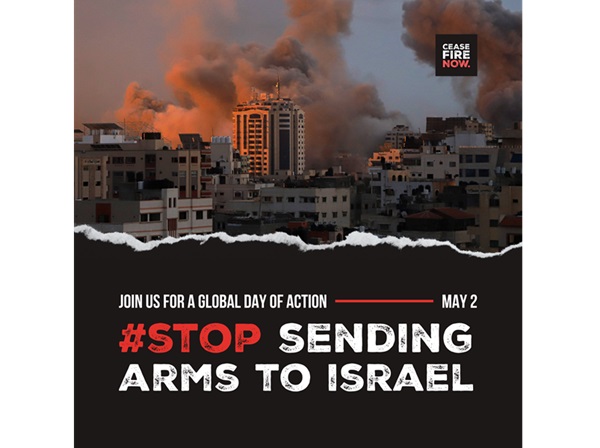 Credit: Amnesty International Luxembourg
Credit: Amnesty International Luxembourg
On Thursday 2 May 2024, Amnesty International Luxembourg announced it stands in solidarity with the global day of action to stop arms transfers to Israel, and thus cease any involvement in possible war crimes against the Palestinian population.
Amnesty International Luxembourg – within the Amnesty International movement and alongside its partners such as Save the Children, Oxfam and Action Aid – expressed its solidarity with the Global Day of Action to stop arms transfers to Israel.
While recalling the urgent demand for the release of Israeli hostages by Hamas and other armed groups, Amnesty International expressed its concern about governments such as those of the United States, the United Kingdom, Germany, Denmark, the Netherlands and Australia, which continue to transfer weapons to Israel and which could be used to commit war crimes against the Palestinian population. Several actors consider that a genocide could be underway, the non-profit organisation added. These transfers could also be considered as cooperation in these war crimes perpetrated, Amnesty International noted.
The bombing and blockade of the Gaza Strip has resulted in an unprecedented humanitarian catastrophe that the Palestinian population is experiencing with 34,262 people dead, including at least 14,500 children, and at least 10,000 people missing (as of the date of 24 April 2024). Civilians in Gaza face an induced humanitarian crisis: the entire population suffers from food insecurity and famine. This reality was recognised by the International Court of Justice on 28 March 2024. Amnesty International confirmed that this situation presents a real risk of genocide.
Additionally, 1,7 million Palestinians have been forcibly displaced, leading to a lack of access to essential goods and services such as food, water, a safe home and medical assistance.
From the perspective of international law, states that continue to transfer weapons to Israel or Hamas and other armed groups while knowing that these actors will commit "internationally unlawful acts", including war crimes and crimes against humanity, themselves run the risk of helping to commit these illicit acts, stressed Amnesty International.
Furthermore, companies that manufacture and export weapons have a responsibility to respect international law and international humanitarian law in their value chains, which are in addition to national legal and ethical obligations. According to Amnesty International, companies that materially assist in the commission of war crimes can be held legally responsible for these unlawful acts.








